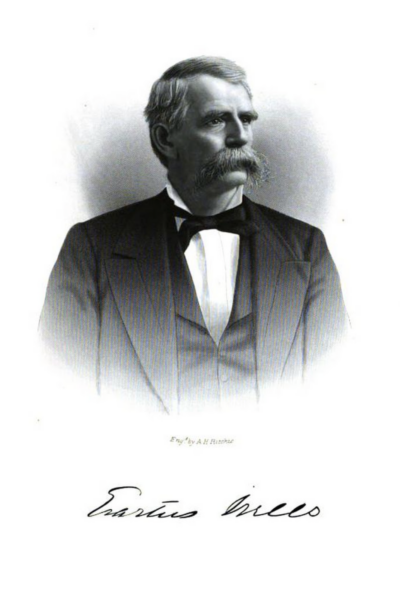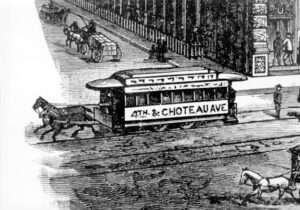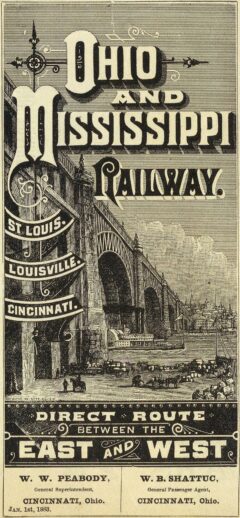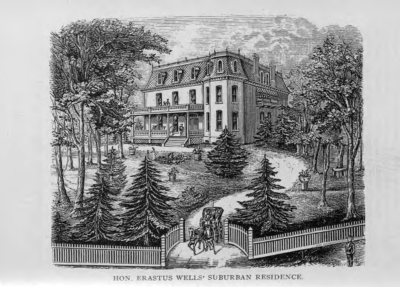
 Erastus Wells
Erastus Wells
2725 Olive Street
Born: December 2, 1822, Sackets Harbor, New York
Died: October 2, 1893, Saint Louis, Missouri
Erastus Wells, who represented the First District of Missouri in the Forty-first, Forty-second, Forty-third, Forty-fourth and Forty-sixth Congresses of the United States and who was, in many respects, one of the most remarkable and interesting men who have left their impress on the history of St. Louis, was born December 2, 1822, in Jefferson County, New York, and died in Wellston, his country home, near St. Louis, October 2, 1893. He was the only son of Otis Wells and a descendant of Hugh Welles, a native of Essex, England, who was one of the early colonists of Wethersfield, Connecticut, and died there in 1645. Through his grandmother, Ethelinda (Otis) Wells, he was a descendant also of John Otis, of Hingham, England, who with other colonists, founded the town of Hingham, Massachusetts, in 1635.
From this ancestry, doubtless Erastus Wells inherited a share of the rich intellectual endowment and physical vigor which constituted his only capital when he began life for himself. His father, who had been a small New York farmer, died when the son was but fourteen years of age and the latter was thrown upon his own resources before he had passed beyond the rudimentary stage of his education. At sixteen, he was a clerk in a store at Watertown, New York, at a salary of eight dollars a month, and later he was employed in a similar capacity at Lockport, New York, with a comparatively small increase of salary. He, however, coupled economy with industry and notwithstanding the smallness of his remuneration, had saved a sum of money approximating one hundred and fifty dollars at the end of four years. He had heard of the great West, with its boundless opportunities for young men and, shortly before he attained his majority, in the year 1843, he came to St. Louis.
He arrived here without sufficient means to engage in any business on his own account, but he had a keeness of perception and resourcefulness which was worth more than cash capital. He brought with him a letter of introduction to Calvin Case, then a prosperous business man in St. Louis, and very soon after he came here he had interested Mr. Case in the inauguration of a new enterprise which proved highly advantageous to both of them. St. Louis, which was then a city of between thirty and forty thousand people was without an omnibus line, and Mr. Wells quickly reached the conclusion that an omnibus could be profitably operated between what was known as the upper ferry landing, at North Market street, and the business portion of the city. Forming a partnership with Mr. Case, they built an omnibus, which he operated for a time himself, and thus established the first omnibus line west of the Mississippi River. Gradually, this method of transporting passengers from one part of the city to another grew in favor, the vehicles belonging to the line multipllied and, after a few years, Mr. Wells sold out his interests for a considerable sum of money.
After that he employed his energies for a time in the operation, first, of a white lead factory, and then of a sawmill, but later became a partner again with Calvin Case and other gentlemen in the omnibus company which controlled all the business in that line in the city. The business grew to large proportions with the city’s rapid increase in population and proved exceedingly remunerative, being terminated finally by the death of Mr. Case and the consequent dissolution of the partnership in 1855. Four years later, Mr Wells became the author of another transportation scheme, procuring, in the year 1859, the charter for the first street railway company, organized in St. Louis and building, as president of the Missouri Railway Company, the first street railway operated west of the Mississippi River. This company laid its line of railway on Olive Street and as its projector, Mr. Wells may be said to have been the father of the street railway system of the city. He continued to act as president of the company until 1883, when he disposed of his interests and ceased to be connected with the intra-mural transportation business of St. Louis. In the meantime, many other enterprises vastly beneficial to St. Louis had felt the stimulating effects of his genius, his indomitable energy and public-spirited action. He was one of the promoters of the Narrow-Guage Railway connecting Florissant with St. Louis, and became president of the corporation operating that line.
 For some years, he was director of the Ohio & Mississippi Railroad and was President also of the Accomodation Bank, vice-president and director of the Commercial Bank, and president of the Laclede Gas Light Company. As a businessman, he was remarkable for his sagacity, his shrewd forecasts of the future, his original and progressive ideas, his prompt and vigorous action, and his boundless faith in the rapid and continuous growth of St. Louis. His range of vision was broad and, taking in the vast territory tributary to this city, noted with accuracy its resources and the possibilities of development. He calculated, with admirable precision, the effect which this rural development would have in building St. Louis, the chief commercial centre of this region, and the large fortune which he accumulated was the resultl of enterprises planned and inaugurated in pursuance of these calculations.
For some years, he was director of the Ohio & Mississippi Railroad and was President also of the Accomodation Bank, vice-president and director of the Commercial Bank, and president of the Laclede Gas Light Company. As a businessman, he was remarkable for his sagacity, his shrewd forecasts of the future, his original and progressive ideas, his prompt and vigorous action, and his boundless faith in the rapid and continuous growth of St. Louis. His range of vision was broad and, taking in the vast territory tributary to this city, noted with accuracy its resources and the possibilities of development. He calculated, with admirable precision, the effect which this rural development would have in building St. Louis, the chief commercial centre of this region, and the large fortune which he accumulated was the resultl of enterprises planned and inaugurated in pursuance of these calculations.
His official life began in 1848, when he was chosen a member of the City Council of St. Louis, In 1854, after an interval of a few years, he was again made a member of that body, serving in it continuously until 1869. As a city legislator, he was the originator and champion of many measures which conferred lasting benefits upon the municipality. He was especially interested always in improving the sanitary conditions of St. Louis and to this end was one of the earliest advocates of the improved water supply system, and one of the most prominent among the men whose continued agitation of the subject finally brought about the establishment of the present system. He was also one of the originators of the legislation which gave the city a metropolitan police force and aided in the inauguration of many other reforms, by no means unimportant, but which attracted to a less degree the general attention of the public. Elected to Congress in 1869 he took his seat in that body in 1869 and for eight years thereafter, served with distinction as a national legislator, ably and faithfully representing his immediate constituents and wielding at all times an important influence in the National Legislature.
Although he was a staunch Democrat, his frienships were never bounded by party lines and, although his party was in the minority while he was in Congress, he obtained his full share of favors from that body for his constituents, the first and substantial appropriation for the improvement of the Mississippi River. Believing fully in the wisdom and justice of asking the government to undertake the improvement of this great national waterway, he rendered Captain James B. Eads’ materal assistance in securing the legislation which resulted in the construction of the jetties at the mough of the river and the consequent improvent of navigation. Although opposed to him politically, he was a personal and confidential friend of General Grant, then president, during his entire term of service in Congress. It was he who first proposed the opening of the Oklahoma country to settlement and the original bill making provision therefore was introduced by him in the Forty-fourth Congress. His liberal views, unquestioned honesty, simplicity of character and rugged common sense gave him great influence in governmental circles at Washington, and Missouri has had few Congressmen who were able to render equally valuable service to the State.
 After his retirement from Congress, failing health kept him from participating in business enterprises or conduct of public affairs, and the remaining years of his life were devoted to travel and to the quiet enjoyment of his fortune at his country home. Mr. Wells married Isabella Bowman Henry, daughter of Captain John Henry of Jacksonville, Illinois, in 1850. Isabella and Erastus Wells were the parents of three children, including St. Louis Mayor Rolla Wells. Well’s first wife died in 1877 and he was later remarried to Mrs. Eleanor P. Bell of St. Louis in 1869.
After his retirement from Congress, failing health kept him from participating in business enterprises or conduct of public affairs, and the remaining years of his life were devoted to travel and to the quiet enjoyment of his fortune at his country home. Mr. Wells married Isabella Bowman Henry, daughter of Captain John Henry of Jacksonville, Illinois, in 1850. Isabella and Erastus Wells were the parents of three children, including St. Louis Mayor Rolla Wells. Well’s first wife died in 1877 and he was later remarried to Mrs. Eleanor P. Bell of St. Louis in 1869.
Erastus Wells died on October 2, 1893, at Wellston, his country home, and was buried at Bellefontaine Cemetery in St. Louis on October 4, 1893. He was 70 years old.
The city of Wellston, Missouri, was named after him. Wells purchased 66 acres of land in St. Louis County in 1868 and built a three-story brick house on the property, which was the family’s country home. That piece of land is part of what is now Wellston. A few years after his death in 1893, the house burned down; the cause of the fire was never determined.
Encyclopedia of the History of St. Louis: A Compendium of History and Biography for Ready Reference., Volume 4, Part 2, 1899